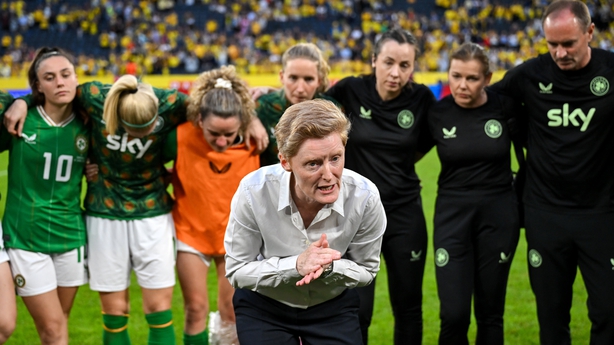The FAI have taken many missteps over the years, but on Sunday night they made a wise decision.
The Republic of Ireland's player media day at the team's Castleknock Hotel base was cancelled, with FAI interim CEO David Courell instead facing the cameras to address the findings of a joint report from RTÉ Investigates and The Sunday Independent.
Under bright blue skies, Courell solemnly apologised to the former women's international players, and female trainees on a FÁS soccer course, who experienced alleged unwanted or inappropriate sexual advances from FAI coaches in the 1990s.
"We need to redouble our efforts and make sure that an awareness of existing safeguarding protocols are fully understood, fully respected," said Courell, "and that people feel and know that they have somewhere to go to if they have an issue."
The story was driven by the unflinching courage of those involved to revisit old traumas and drag cultural failings into the light. Their unity will change the landscape. Precautionary measures have already been put in place to protect current players, while a safeguarding awareness campaign called 'Play It Right' has been launched.
Still, Courell's admission that no official FAI policy around relationships between players and coaches currently exists in the domestic club game underscored the work that has yet to be done.
Scrapping the media day meant current players weren't lightning rods for the latest storm around the association.
Ordinarily there'd be a drip feed of stories in print and online over the next few days looking forward to the Girls In Green's Euro 2025 qualifier against England at Carrow Road on Friday.
Now, the build-up will be overshadowed by questions, debate and discourse surrounding historical inadequacies regarding the safeguarding of players against potential coercive control, as well as the abuse of power imbalances.
Watch: RTÉ Investigates: 'Girls in Green' on the RTÉ Player
Irish women's football has had some landmark moments in recent times but it seems every morsel of glory comes wrapped in a bitter shell of off-the-field controversy.
Seven years ago in Dublin's Liberty Hall, the squad laid bare the woeful conditions they were enduring to represent the country: changing in airport toilets, sharing tracksuits with the underage boys' teams, no access to gyms, fighting to get modest financial reward at a time when they were all mostly part-time.
A core of the players who took a stand that day are still involved, and they've since witnessed the type of positive change they could only dream of seven years ago. Qualifying for a first ever World Cup, walking out in front of almost 76,000 fans in Sydney to play Australia, then making more history at the Aviva Stadium - these were precious moments, made all the sweeter by the hardships it took to get there.
Along the way there's been controversies and lows. The brilliant play-off win against Scotland in Hampden Park was immediately soured by footage of the team singing Celtic Symphony by The Wolfe Tones in the dressing room; while Vera Pauw's drawn-out departure was painful for all parties.
Pauw has always strongly refuted allegations that while manager of Houston Dash from November 2017 to September 2018, she shamed players for their weight and attempted to exert excessive control over their eating habits. The FAI publicly supported their manager, but things went south at the World Cup in Australia and Pauw's contract was not renewed after the tournament.

Eileen Gleeson (above) lifted morale by taking the reins and overseeing a flawless UEFA Nations League campaign that ended with the Dubliner getting the gig permanently.
She was a player herself during the 1990s, but Gleeson was never around the Ireland setup during that era. By her own admission, she wasn't good enough to get capped and spent most of her career in the Dublin Women's Soccer League with Ballymun United and Hammond Celtic.
Her true calling was coaching. Gleeson has been steeped in the domestic game for 25 years and though it's unlikely she'll have been overly surprised to read and hear the weekend's revelations, it will hurt.
As a figurehead for women's football in this country, Gleeson will be prepared for difficult questions around the past, and the future, when she faces the media in Norwich on Thursday.
Then she'll set her side up to try and nick something off a supreme English team. Ireland will finish bottom of the four-team Euro 2025 qualification group but are guaranteed a place in the autumn's play-offs. Every result affects their seeding for those games (they will play a League C team in the semi-finals but could potentially get a higher-ranked League B side in the two-legged final if their ranking points are low).
It's important they don't suffer a heavy beating on Friday night, or indeed against the French who they host at SuperValu Páirc Uí Chaoimh the following Tuesday.
Calculating all the permutations is the kind of humdrum stuff that everyone wants to focus on when it comes to the women's team. They spent decades fighting for an adequate sporting environment that gives them an opportunity to be competitive; for the narrative to be solely around their achievements - or indeed shortcomings - on the field of play.
That battle continues.
As former player Jackie McCarthy-O'Brien says in the RTÉ Investigates programme: "Nobody wants to be the whistle blower... but we have to."
Watch England v Republic of Ireland in Women's Euro 2025 qualifying on Friday from 7.35pm on RTÉ2 and RTÉ Player. Follow a live blog on rte.ie/sport and the RTÉ News app and listen to live commentary on 2fm's Game On


